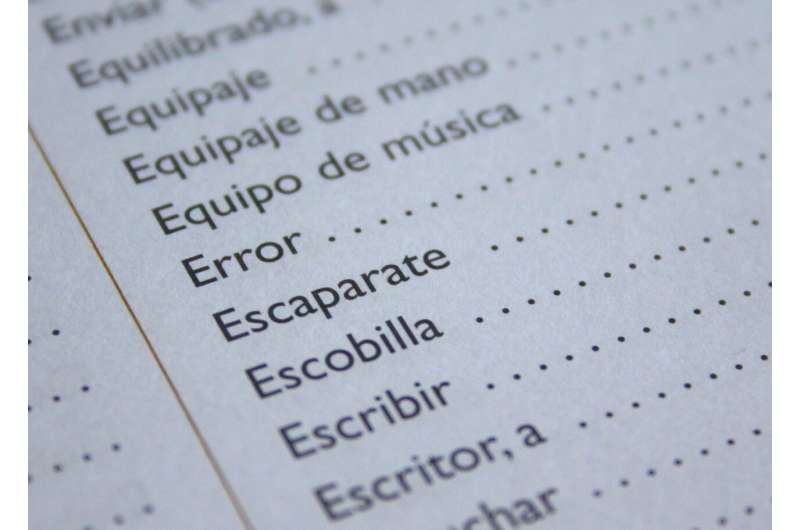Speak more Spanish in public, urge scholars, to combat stigma in US

In 2018, a Montana border patrol agent asked two U.S. citizens in a grocery store parking lot for their government IDs. "I saw that you guys were speaking Spanish, which is very unheard of up here," he reportedly told them. A week later in New York, a white lawyer threatened to call U.S. Immigration and Customs Enforcement agents on restaurant staff who were speaking Spanish with one another.
Verbal and physical attacks on people speaking Spanish in the U.S., which grew in the wake of Donald Trump's 2016 anti-immigrant campaign, have spurred UC Berkeley linguist Jhonni Carr and literary scholar Román Luján to campaign for linguistic solidarity.
Specifically, they want non-native Spanish speakers to speak more Spanish in public—though not in a mocking way—and combat an English-only nativist movement.
"If you know some Spanish, you are ready. You should start speaking the language, even if it's your second or third language. It doesn't matter, as long as you start doing it," Luján told an audience of more than 50 students globally at a talk this week hosted by Rhode Island College's Department of Modern Languages.
"You can visualize our proposal as a force field that works to create a barrier against discrimination and contributes to the normalization of Spanish as a safer language to speak," added Luján, a lecturer in UC Berkeley's Department of Spanish and Portuguese.
Added Carr, a UC Berkeley lecturer in Spanish linguistics: "This is not a proposal directed at those experiencing racial and linguistic types of discrimination. This is for linguistic allies who want to actively contribute to preventing it, rather than just reacting after the fact."
A constitutional right
In their talk, Carr and Luján presented data to put the Spanish language in global and national context. After Mandarin, Spanish is the most spoken language in the world, with more than 470 million native Spanish speakers. It ranks as the official or national language in more than 20 different countries.
Spanish is also the second most spoken language in the U.S., with 56 million native Spanish speakers, Carr said.
Notably, she added, while English is the dominant language in the U.S., it is not the official language. The country's founding fathers didn't find it necessary to declare it so in the Constitution, and several proposed amendments to make it official have thus far failed.
"Freedom of speech includes freedom of language choice. So, we are actually protected by the Constitution in speaking the language of our choice," Carr said. "And yet, we hear about violent verbal attacks, threats of deportation and assaults for speaking Spanish while brown, Black or Indigenous."
Carr and Luján argued that moves to suppress Spanish speech in public places are not only unlawful, but examples of social and racial injustice. They propose that one way to combat the stigma of speaking Spanish is to speak more Spanish.
Avoid 'mock Spanish'
That said, by Spanish they don't mean phrases commonly used by English speakers in a ridiculing manner.
"We're talking about real Spanish, not mock Spanish, such as, "No problemo," or "No bueno," or "Hasta la vista,'" Carr said. "These phrases actually serve to produce a cartoonish version of Spanish."
But code-switching, or speaking Spanglish, a combination of Spanish and English, is also an option, Luján said.
"If that is the way that you are going to include more Spanish in your conversation, by all means, mix languages within your discourse," he said. "The ultimate goal is to create a cultural shift by speaking more Spanish in public."
Carr, whose second language is Spanish, acknowledged the discomfort people feel when they're not fluent in a language, but said that shouldn't stop them from trying.
"Spanish is not my first language, and so I also have experienced shyness or linguistic anxiety or insecurity in public," she said.
Ultimately, Carr said, "We are proposing the greater use of Spanish by allies. So, in order to make a visible change, we encourage you to predominantly focus on challenging yourself and other second-language speakers of Spanish to use the language in public in order to protect others with your words."
Provided by University of California - Berkeley

















